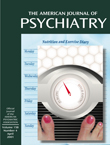Risperidone-Induced Retrograde Ejaculation
To the Editor: Schizophrenic patients treated with antipsychotic drugs may suffer from a variety of sexually disabling side effects that can affect all domains of sexual activity. The most common such adverse effects in men are erectile dysfunction and retrograde ejaculation (1). Retrograde ejaculation has been mostly reported in association with typical antipsychotics, especially thioridazine (1); among the atypical antipsychotics, to our knowledge, only clozapine has been reported to cause retrograde ejaculation (2). We describe a schizophrenic patient with risperidone-induced ejaculatory failure that was compatible with retrograde ejaculation, both clinically and in the laboratory.
Mr. A was a 37-year-old man who was married with three children and who met DSM-IV criteria for paranoid schizophrenia. He was physically healthy, had no apparent concomitant general medical condition, and had never experienced ejaculatory problems. He had his first overt psychotic episode at age 29 and was successfully treated with perphenazine, 32 mg/day, without any major adverse effects. He was admitted to our psychiatric inpatient ward after a second psychotic exacerbation of the disorder and after being drug free for about 6 years. On admission, treatment with risperidone was initiated; the dose was increased to 4 mg/day by 1-mg/day increments and thereafter remained constant.
On days 6, 9, and 14 after the initiation of risperidone treatment, Mr. A engaged in sexual intercourse with his wife, after which he reported having ejaculatory difficulties compatible with retrograde ejaculation. A condom was used during all encounters. He reported a complete failure to emit semen but a normal desire, erection, and sense of orgasm. Postcoital urine was collected after days 9 and 14, and semen was evident on evaluation of the samples on both occasions. A reduction of Mr. A’s risperidone dose to 3 mg/day was associated with partial restoration of anterograde ejaculation.
Retrograde ejaculation is the consequence of surgical procedures or is associated with the use of various neuroleptic and nonneuroleptic drugs (3). These effectors are presumed to alter the sympathetic tonus of the bladder or urethral sphincter, allowing semen to pass retrogradely into the bladder during ejaculation. To date, all drugs reported to induce retrograde ejaculation share the capacity to significantly antagonize the α 1-adrenergic receptor (3). We assume that risperidone, a potent α 1-adrenergic receptor antagonist, induces retrograde ejaculation by means of a similar mechanism. The initial rapid escalation of the patient’s dose by 1 mg/day might have also contributed to the emergence of retrograde ejaculation, as described in other cases of neuroleptic-induced retrograde ejaculation (4). The incidence and clinical implications of risperidone-induced retrograde ejaculation and its effect on patient compliance merit further investigation.
1. Segraves RT: Effects of psychotropic drugs on human erection and ejaculation. Arch Gen Psychiatry 1989; 46:275–284Crossref, Medline, Google Scholar
2. Jeffries JJ, Vanderhaeghe L, Remington GJ, Al-Jeshi A: Clozapine-associated retrograde ejaculation (letter). Can J Psychiatry 1996; 41:62–63Medline, Google Scholar
3. Shiloh R, Nutt D, Weizman A: Ejaculation: supposed mechanism and various agents that can affect retrograde ejaculation, in Atlas of Psychiatric Pharmacotherapy. London, Martin Dunitz, 1999, pp 86–89Google Scholar
4. Aizenberg D, Shiloh R, Zemishlany Z, Weizman A: Low-dose imipramine for thioridazine-induced male orgasmic disorder. J Sex Marital Ther 1996; 22:225–229Crossref, Medline, Google Scholar



